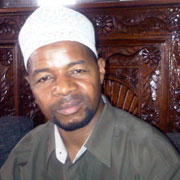Mohid Nassor Salim is a native of northern Pemba and a member of Ngezi Natural Resource Conservation (NNRC). He has lived in Pemba his entire life and describes the island as being inhabited by small-holder farmers who rely almost entirely on fish as their main source of food. Mohid has observed changes in the climate and environment in Pemba during his 43 years living there.
First, he is alarmed by the increasing water levels on the island. He recalls his youth when the sea would not come inland as much as it does now. Now, he sees less coconuts on the ground, because they have been eroded or washed away by the increasing water levels on the island. He even describes the horror of seeing dead bodies floating from old burial grounds that are now being swallowed by raising water levels. In addition to this, farmers are affected as the increasing water levels means that more areas are becoming increasingly salty and less arable.. Mohid raises the question – what will happen in the next 20 years at this rate? How many areas will be affected by rising sea levels and increased salinity?
Second, he’s noticed changes in the rainfall patterns. Mohid remembers how full the rivers and lakes used to be between March and May of every year when he was young. At this time fish, such as the ‘kambare,’ were in abundance. However, this is no longer the case. Most of the lakes and rivers have dried up and he instead watches young boys and girls play soccer in the areas that previously would have been filled with water. As a result, certain foods have been completely eliminated. For example, yams were plentiful up to the 1980s, but since the 1990s, you see a decrease in the amount of yams being produced annually. He attributes this to the change in rainfall patterns. In the past, the ‘masika’, ‘vuli’ and ‘mchororo’ rains were consistent. People knew to plant long lasting trees, such as coconuts during the ‘masika’ rains for example, or to plant food crops during ‘vuli’ rains and food crops for business/market selling in ‘mchororo’ season. However, this consistency is no longer present. The result is a decrease in fertility of land as well as contamination of what once were clean water sources because people are changing where to plant their crops as they search for water.
Finally, Mohid is very concerned about how all these climatic changes are impacting the overall landscape of his island as well as the people of Pemba. His village used to be called “kijiji cha rangi kijani” (green village) because of the luscious trees and greenery. However, it is no longer as green as it used to be, as trees are being cut down or the land is being erode from water and salt. This has also affected the presence of animals and birds. As farming and fishing are being affected by climate change, Mohid is seeing a migration of people to the mainland to start small business and shops.
With such impacts, Mohid is very involved in activities that try to mitigate the negative effects of climate change. He is involved in various tree planting activities as well as awareness raising at the community level. He is also looking to work more in adaptive farming practices to help reduce the impacts of climate change.

